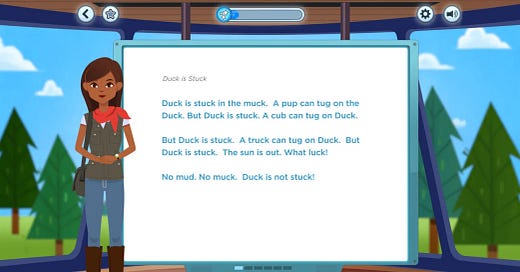Welcome to this week’s edition of our newsletter, where we explore transformative AI tools, address ethical considerations, and share insightful resources to help educators and librarians navigate the evolving digital landscape. In this issue, we spotlight Amira Learning—a breakthrough reading tutor—and delve into key ethical questions raised by a recent NCES study. We also feature a curated reading list of articles that offer fresh perspectives on how AI is shaping education.
NotebookLM - Deep Dive:
Spotlight: Amira Learning – Empowering Literacy Across Classrooms and Libraries
Amira Learning is an innovative AI-driven reading tutor that harnesses advanced speech recognition and natural language processing to transform literacy education. By providing instant, personalized feedback on fluency and comprehension, it enables educators to identify specific reading challenges and support every student’s growth.
For Educators:
Dynamic Classroom Integration: Employ Amira during reading sessions to receive real-time assessments that pinpoint areas for improvement.
Individualized Tutoring: Combine one-on-one instruction with tailored exercises informed by Amira’s insights.
Seamless Remote Learning: Utilize its online platform to deliver consistent, quality feedback in virtual environments.
Special Education Adaptability: Leverage personalized feedback to address the unique needs of students with learning differences.
For Librarians:
Interactive Literacy Workshops: Incorporate Amira into reading clubs or storytime sessions to boost engagement and confidence.
Community Outreach Initiatives: Extend its benefits through after-school or summer programs that foster a love for reading.
Collaborative Resource Sharing: Use performance data to coordinate with teachers and parents, building a supportive network for young readers.
Data-Driven Program Design: Analyze insights from Amira to develop targeted library activities that tackle local literacy challenges.
AI Ethics in Education: Navigating Data Privacy and Bias
A recent study by the National Center for Education Statistics has spotlighted several ethical concerns as AI tools become increasingly prevalent in educational settings. Key takeaways include:
Data Privacy: The study emphasizes the need for transparent policies regarding the collection, storage, and usage of student data. Protecting sensitive information is paramount.
Algorithmic Transparency and Fairness: Ensuring that AI systems are free from hidden biases is essential for maintaining trust and equity. Educators must understand how these systems operate.
Ongoing Professional Training: Regular digital literacy and ethics training for teachers and librarians is crucial to responsibly integrate AI tools and navigate emerging challenges.
Policy Development: Establishing robust institutional guidelines can mitigate risks and ensure that AI enhances learning without compromising ethical standards.
For further details, you can explore the NCES study results .
Reading List: Explore How AI is Shaping Education
Expand your understanding with these timely articles and video resources:
What Digital Citizenship in 2025 Looks Like—and How It Taught PerfCon? (EdTech Magazine)
Delve into the evolution of digital citizenship as schools redefine ethical practices and performance standards for a tech-centric future.
Read moreAI Tool Demo: Canvas Text-to-Image Generator (Edutopia Video)
Watch this engaging demo showcasing the Canvas Text-to-Image Generator—a creative AI tool that transforms textual prompts into vivid imagery, perfect for infusing creativity into your classroom lessons.
Watch the demoAddressing AI Use Proactively in the Classroom (Edutopia)
Discover practical strategies for integrating AI into teaching practices responsibly. This article outlines guidelines for setting clear expectations, enhancing digital literacy, and mitigating potential pitfalls.
Learn more
As AI continues to reshape the landscape of education, tools like Amira Learning offer remarkable opportunities to enhance literacy and personalize learning experiences. However, as our NCES study highlights, ethical considerations around data privacy and fairness remain critical. By staying informed and leveraging quality resources, educators and librarians can lead the way in fostering safe, engaging, and transformative learning environments.
Stay curious, stay critical, and keep exploring new ways to enrich the educational journey for every student.
Happy reading and teaching!
📘 Love this newsletter? Dive deeper into the world of AI in education with my book, AI In The Library: Strategies, Tools, and Ethics for Today’s Schools.
Whether you're a school librarian, educator, or administrator, this practical guide is packed with ready-to-use tools, lesson ideas, and insights to help you confidently navigate AI in your library or classroom.
👉 Available now on Amazon: https://a.co/d/aRupXMy





